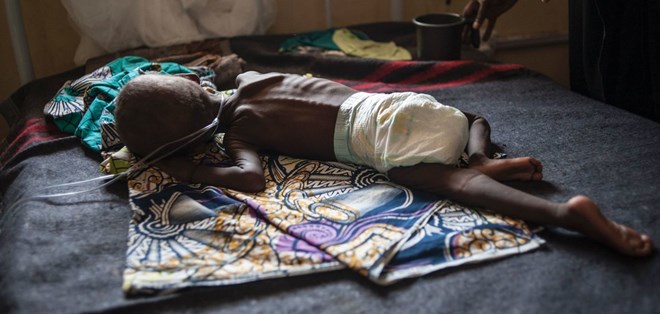
Thursday August 17, 2017
By Carolyn Miles
Americans are exhausted keeping up with Donald Trump’s every tweet. People in Somalia, South Sudan, Nigeria, and Yemen are exhausted by violence and hunger.
Photo credit: STEFAN HEUNIS/AFP/Getty Images
Americans are exhausted by political infighting, government inaction, and tweets. In East Africa, the Lake Chad basin, and Yemen, people are exhausted by violence and hunger. Millions have fled their homes to escape deadly conflicts, walking hundreds of miles and eating just one meal per day, if they are lucky. Malnutrition is making them susceptible to life-threatening illness, and they are forced to watch their livestock — the only way to make a living in many of these communities — starve to death. The United Nations has called this the worst humanitarian emergency since World War II, with 20 million people at risk of starvation in just four African and Middle Eastern countries.
And yet most Americans have only a vague idea this is happening. A recent poll by the International Rescue Committee (IRC) showed that only 15 percent of Americans had “a lot” of awareness of the ongoing global hunger crisis. Aid organizations like mine are struggling like never before to get people to pay attention. We just can’t seem to cut through the daily onslaught of U.S. political news.
In drought-stricken northern Kenya last month, I met mothers who were forced to make decisions that no mother should ever have to make: Which of their children should they try to save? Many brought only their healthiest kids for treatment at our outreach clinic in Turkana County, the ones they thought could survive. They had left the sickest ones at home to die. Families in this region have raised livestock for hundreds of years, but this year’s drought has been the longest and most severe that they can remember. Many have watched their herds of sheep and goats die off — both because of a lack of water and, in a cruel twist, because on the rare occasion that it does rain, the animals drown in flash floods or drink too much and die of water intoxication.
In Turkana County alone there are 60,000 children who could die in the next three months unless we deliver additional aid. The data shows that this drought is proving to be worse than the devastating 2011 drought in nearly Somalia, where a quarter of a million people died — half of them before the U.N. famine declaration. According to UNICEF, nearly 1.4 million children are at imminent risk of death in Somalia, South Sudan, Nigeria and Yemen; that’s more children than are enrolled in school in all of New York City.
A critical lesson from the 2011 drought was that we have to act early — and humanitarian groups have. Save the Children is screening children for malnutrition, providing supplemental feeding and water purification tablets, and trucking in water, as are other nongovernmental organizations and aid agencies. The U.S. government has also stepped up. In May, Congress appropriated an additional $990 million for emergency aid to Nigeria, South Sudan, Somalia, and Yemen. Those funds bring the total U.S. humanitarian relief budget to $9.3 billion this year. And one bright spot in an otherwise dire story is that U.S. humanitarian assistance continues to be a bipartisan cause.
But the scale of the need continues to dwarf the scale of the assistance. The U.N.’s $4.9 billion humanitarian appeal is just 50 percent funded — and that’s only for Nigeria, South Sudan, Somalia, and Yemen. Eight of the largest U.S.-based humanitarian NGOs have responded by forming the Global Emergency Response Coalition to raise awareness and funds to help those in desperate need in 10 countries impacted by drought and conflict.
When Americans know about crises, they are unbelievably generous. We saw this generosity after the earthquake in Nepal and during the Ebola crisis in West Africa. But while the media and much of the American public was obsessing about President Donald Trump’s tweets, rains and harvests were failing, conflict was escalating, and mothers were losing their children in places like northern Kenya. It’s time to log off Twitter and do something about it. No child should die of malnutrition in 2017.